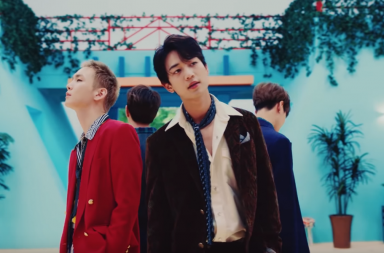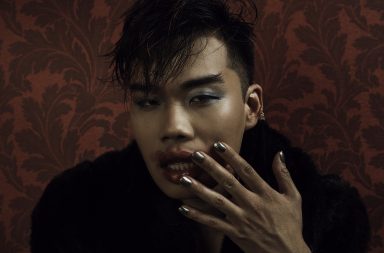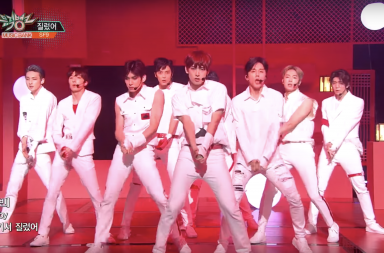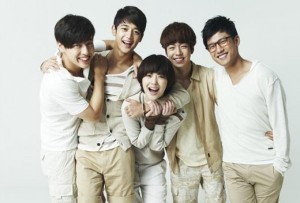 Earlier this week, my fellow writer Jen put notice to a worrying trend of K-Dramas and their “pseudo-homosexuality.” Presented in the article are dramas — many of which have become very popular internationally and domestically — that use homosexuality as a plot device. Whether the device was used to bring Lee Min-ho‘s and Son Ye-jin‘s characters under one roof so playful antics would ensue in Personal Preference or to cause turmoil by forcing second male leads to tragically question their sexuality in those countless cross-dressing dramas that include (but are not limited to) You’re Beautiful and the recent To the Beautiful You, it was concluded that these dramas didn’t really tackle the issue of homosexuality head on.
Earlier this week, my fellow writer Jen put notice to a worrying trend of K-Dramas and their “pseudo-homosexuality.” Presented in the article are dramas — many of which have become very popular internationally and domestically — that use homosexuality as a plot device. Whether the device was used to bring Lee Min-ho‘s and Son Ye-jin‘s characters under one roof so playful antics would ensue in Personal Preference or to cause turmoil by forcing second male leads to tragically question their sexuality in those countless cross-dressing dramas that include (but are not limited to) You’re Beautiful and the recent To the Beautiful You, it was concluded that these dramas didn’t really tackle the issue of homosexuality head on.
As said, in these dramas, homosexuality was only used as a device, being dramatized or overly exaggerated, used only to inflict conflict or humor. The characters these dramas painted weren’t truly gay; Lee Min-ho’s character only posed as a gay man to be allowed to live with a female, and those boys in the cross-dressing dramas who believed they had feelings for a male were in reality, smitten with a female only dressed as a male. 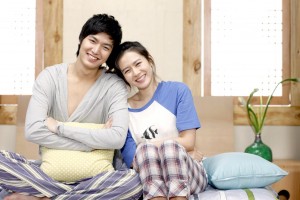 While it was thought that even the inclusion of these taboo topics was a step up for the very restricted and conservative Korean society as at least the topic was being acknowledged and presented to society — even breaking gender stereotypes as well, it also seemed a bit unfair to those in the LGBTQ communities in Korea to have their sexual orientation, usually a huge aspect of their lives and lifestyles, be used as marketing ploys, a gimmick almost, to cater to an audience.
While it was thought that even the inclusion of these taboo topics was a step up for the very restricted and conservative Korean society as at least the topic was being acknowledged and presented to society — even breaking gender stereotypes as well, it also seemed a bit unfair to those in the LGBTQ communities in Korea to have their sexual orientation, usually a huge aspect of their lives and lifestyles, be used as marketing ploys, a gimmick almost, to cater to an audience.
But not all Korean dramas handle homosexuality in the indirect, wishy-washy ways some of the dramas described above do. There are truly dramas out there that handle the topic more literally, and consequently, more laudably as well. In my opinion, these dramas do much better jobs at bringing the topic of homosexuality to Korea’s door. These dramas avoid the relationships based on and supported by what are basically lies, and they also keep away from the (borderline hypocritical) sighs of reliefs upon realizing the truth of the matter. These dramas tell of true homosexual characters and paint them as real people that just happen to be gay, not as some device used to make complications to the plot.
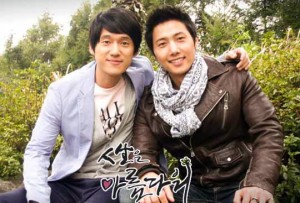 First of all, there was drama Life is Beautiful, which first aired in 2010. Life is Beautiful told the story of a family living in Jeju island, but is probably best known for the gay couple the drama detailed, portrayed by actors Song Chang-eui and Lee Sang-wook. The nature of their relationship was very devoted, and their progression was very natural, not at all wishy-washy or indirect in terms of portraying the matter at hand, being just a love story between two men. The characters painted were clearly gay men, and the drama made sure to show that by portraying events that could happen to a member in Korea’s LGBTQ community, from the closeted feelings, anxiety of coming out, and family disapproval. As the drama’s (influential and renowned) scriptwriter Kim Su-hyeon said,
First of all, there was drama Life is Beautiful, which first aired in 2010. Life is Beautiful told the story of a family living in Jeju island, but is probably best known for the gay couple the drama detailed, portrayed by actors Song Chang-eui and Lee Sang-wook. The nature of their relationship was very devoted, and their progression was very natural, not at all wishy-washy or indirect in terms of portraying the matter at hand, being just a love story between two men. The characters painted were clearly gay men, and the drama made sure to show that by portraying events that could happen to a member in Korea’s LGBTQ community, from the closeted feelings, anxiety of coming out, and family disapproval. As the drama’s (influential and renowned) scriptwriter Kim Su-hyeon said,
“This is the face of any family … there is the possibility to have a gay [family] member … I don’t like discriminating against others.”
But as one might expect in Korea’s very conservative society, the drama faced its controversies and what controversies they were. Other than the unfortunately inevitable few that were just not receptive of the idea of airing a same-sex couple in prime-time television, 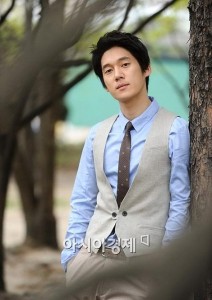 some were even hostile to the idea. Ads were made from a national mother’s group warning:
some were even hostile to the idea. Ads were made from a national mother’s group warning:
“When my son becomes gay and is inflicted with AIDS after watching Life is Beautiful, SBS should take the blame.”
When I first read it, the generalization almost sickened me. But besides that, the drama was banned from prisons, under the basis that it might “negatively affect prisoners.” The whole controversy just exploded when a crucial scene where the two said gay characters make their vows in a church was prevented from being filmed as it would have portrayed the relationship as positively.
In response to all the opposition towards the drama, many from the opposite side voiced their disappointment and anger over the matter. Kim Su-hyeon voiced her extreme disappointment in the removal of the church scene, and gay actor Hong Seok-cheon voiced his anger over the matter, gaining the support of many. But despite the endless controversies surrounded the drama, it brought in some relatively impressive ratings, so you can take that for all it’s worth.
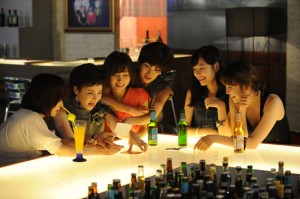 But LGBTQ matters in media, as we know, are not restricted to just talking about gay men, as drama special Daughters of Club Bilitis showed. The special drama portrayed the relationships of three separate lesbian couples of different age groups, and it was applauded for accurately portraying conflicts real same-sex couples could have faced, as well as the strong acting of the main females. But much like Life is Beautiful, Daughters of Club Bilitis was met with a boatload of skepticals and criticism. All the criticisms directed to KBS, the drama’s network, and the writers eventually led to the halting of replays on the station, supposedly to keep teens from getting negatively influenced.
But LGBTQ matters in media, as we know, are not restricted to just talking about gay men, as drama special Daughters of Club Bilitis showed. The special drama portrayed the relationships of three separate lesbian couples of different age groups, and it was applauded for accurately portraying conflicts real same-sex couples could have faced, as well as the strong acting of the main females. But much like Life is Beautiful, Daughters of Club Bilitis was met with a boatload of skepticals and criticism. All the criticisms directed to KBS, the drama’s network, and the writers eventually led to the halting of replays on the station, supposedly to keep teens from getting negatively influenced.
And then there is Answer Me 1997 which has been recently charming the hearts of many fans (definitely including this writer) with its authentic teenage drama, spreading rapidly through word of mouth. The brilliant writers of this endearing drama not only showed their expertise through the amazing development and hilarious meta, but they also proved to be very gutsy, tackling some of society’s taboos, of which include homosexuality through character Kang Joon-hee played by Infinite‘s Hoya.
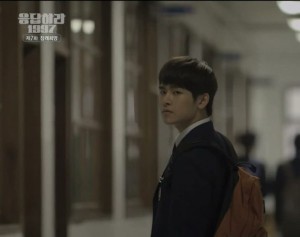 Other than the writers who deserve praise for the masterful and genuine way they handle Joon-hee, fleshing him out way beyond his homosexuality to one of the show’s most beloved characters, Hoya, an idol, also deserves praise for even taking the role. Idols undeniably do all they can to keep their image as universally appealing as they can, and many would stay away from such a role that could cause so much controversy. But Hoya defied the normal and took on the role, and his courage and his endearing portrayal of his character get huge amounts of praise from me.
Other than the writers who deserve praise for the masterful and genuine way they handle Joon-hee, fleshing him out way beyond his homosexuality to one of the show’s most beloved characters, Hoya, an idol, also deserves praise for even taking the role. Idols undeniably do all they can to keep their image as universally appealing as they can, and many would stay away from such a role that could cause so much controversy. But Hoya defied the normal and took on the role, and his courage and his endearing portrayal of his character get huge amounts of praise from me.
Joon-hee’s love life and his one-sided crush on his best friend Yoon-Jae (played by Seo In-guk) is treated just as fairly as the other relationships the show portrayed — maybe even becoming more fleshed out than some of the other established couples. Joon-hee’s crush on Yoon-Jae received notably less backlash than previous dramas Life is Beautiful and Daughters of Club Bilitis, and this can definitely be credited in the writers’ more careful, yet still as impactful way of handling the crush. As PD Shin Won-ho (not to be confused with Shin from Cross Gene who shares the same name) described,
“The story that we wanted to tell was ‘so and so likes and so.’ … We just wanted to say Kang Joon-hee likes Yoon Yoon-jae”
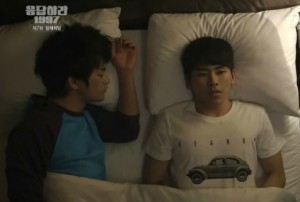 This “love is love” ideal really is the more applaudable route to take when handling homosexuality if one doesn’t directly want to tackle it since it keeps the development concrete and the love universal. Answer Me 1997 did a wonderful job at that, and some cross-dressing dramas such as Coffee Prince also carry this ideal as well, making them a bit more forgivable than the rest.
This “love is love” ideal really is the more applaudable route to take when handling homosexuality if one doesn’t directly want to tackle it since it keeps the development concrete and the love universal. Answer Me 1997 did a wonderful job at that, and some cross-dressing dramas such as Coffee Prince also carry this ideal as well, making them a bit more forgivable than the rest.
But ultimately, I just want to give the writers of these works and the actors/actresses that play them a big hand. They present such a sensitive matter in such a refreshingly concrete way to an audience that may not receive their works very kindly. While getting the topic out there can be considered a fair step-up already as the cross-dressing dramas and the like can possibly do, I feel these dramas are the better way to progress the LGBTQ community in Korea through media. These dramas are the real conversation starters-that really push the envelopes, since they don’t really exaggerate, parody, or dramatize the very real problem they’re touching upon. But what do you think Seoulmates? Do you think these dramas handled the topic of homosexuality well and applaudibly? Are there any other dramas not listed that you felt handled homosexuality in a realistic, applaudable way? And what do you think about the use of homosexuality in Korean dramas in general? Make sure to leave your thoughts, views, and opinions, and don’t be afraid to get lengthy.
(SBS, KBS, tvN, dramabeans, OSEN, MyDaily, HanCinema, Newsen, infiniteupdates@tumblr, Nate, Naver)
